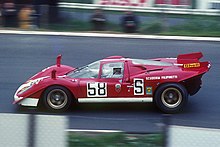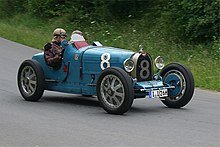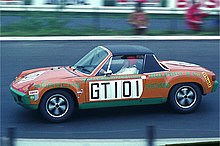Sports car


The term sports car usually refers to two-seater passenger cars with a relatively low overall height (or two-seater with two additional emergency seats), the design of which is usually more driving performance than a four-seater car and good handling. Sports cars are characterized by a low power-to-weight ratio (partly due to powerful motors), above-average braking systems and stiff chassis . In contrast, comfort, utility and suitability for everyday use are of secondary importance for pure sports cars. They differ in this from the sports coupes and sports convertibles such as the VW Karmann-Ghia , which have the same chassis as a car, and from sports sedans .
The precise definition of a sports car is often difficult because there are no set criteria or data that make a vehicle a sports car. Particularly powerful vehicles are also known as super sports cars .
The Federal Motor Transport Authority (Kraftfahrt-Bundesamt ) sometimes classifies vehicles into the sports car category that do not fully correspond to the “General characteristics” section below. Sports cars within the meaning of the FIA regulations from 1966 to 1975 were racing vehicles that, like the Porsche 906 or the Ford GT40, could have been approved for road traffic. Be in the category sports car to participate in a race which had to homologation by first and at least 50 have been built since 1969 at least 25 pieces of the same type.
General characteristics
- deep center of gravity
- aerodynamically optimized construction of the body , thus the best compromise between downforce and top speed
- optimal axle load distribution: 50 to 40 percent on the front axle
- above-average acceleration values
- low power-to-weight ratio
- high power density of the motor, mostly due to very high speed ( short stroke )
- Sports suspension tailored to a sporty driving style
- small storage space or trunk
General
Also, Gran Turismo (GT) and muscle cars are in the conventional sense sports cars, especially if they - are used in racing and the abbreviation "GT" indicates not only a "certain" sportiness - possibly in a modified version.
In motorsport there are sports car races in different categories, for example the FIA GT championship .
Sports cars are often compared in different performance areas. These include, for example, top speed and acceleration , but also lap times on racetracks .
The fastest street-legal super sports car in the world in terms of top speed is the Koenigsegg Agera RS. In 2017 it replaced the Bugatti Chiron as the fastest production vehicle to date. Koenigsegg test driver Niklas Lilja set the new record on a cordoned off highway section in the Nevada desert (USA); it is 446.97 km / h.
The fastest production sports car in terms of acceleration is the Aspark Owl, an electric sports car that took just 1.9 seconds from 0 to 100 km / h.
The fastest production sports car currently approved for road use on the Nürburgring Nordschleife is the Porsche 911 GT2 RS of the 991.2 series with a lap time of 6:58 minutes.
New registrations in Germany
Since 2007, the lead Federal Motor Vehicle Office , the segment sports cars . For figures on the annual new registrations of passenger cars in the sports car segment in Germany according to statistics from the Federal Motor Transport Authority, see the list of new passenger car registrations in Germany by segment and model series # Sports cars .
Web links
Individual evidence
- ↑ Alfred Prokesch: Knaur's great book about the car. Doermer Knaur Verlag Schoeller & Co., Ascona 1980, ISBN 3-85886-089-1 .
- ^ Ferruccio Bernabò: racing car. Südwest Verlag, Munich 1973.
- ↑ In 1.92 seconds (!) From 0 to 100 km / h: Aspark Owl sets a record sprint. In: autorevue.at. February 20, 2018, accessed on July 1, 2019 (German).
- ↑ The fastest sports car - Rent for Speed sports car rental. Accessed July 1, 2019 (German).


